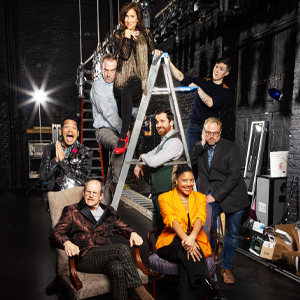
By Dennis Razze
I first saw the original production of Evita in San Francisco at the Orpheum Theatre in 1979 during its pre-Broadway tryout period before its New York premiere. The cast included a fiery young actress named Patti Lupone as Eva and an equally young Mandy Patinkin as a bitter and passionate Che, along with Bob Gunton playing a politically pragmatic General Juan Perón. I knew nothing about the musical I was going to see, nor did I frankly know anything about the Peróns. The musical, already a hit in London, was to be transferred to Broadway that fall. I had always admired the work of Hal Prince, the director, and was a fan of Andrew Lloyd Webber’s earlier rock opera, Jesus Christ Superstar.
The Broadway production of Evita swept the 1980 Tony Awards and became the first British musical to win the Tony Award for Best Musical. It won a total of eight Tony Awards including Best Score, Best Book, Best Lyricist, Best Director, Best Leading Actress in a Musical, and Best Featured Actor in a Musical.
Growing up in an era of Rodgers and Hammerstein book musicals, I had never seen anything like Evita—a sung through musical/opera staged in Brechtian style by Prince and a young choreographer named Larry Fuller. Bertolt Brecht was a German playwright and director I had studied in graduate school who, along with a collection of terrific plays, had created the very dark musical The Threepenny Opera, scored by the genius composer Kurt Weill. Like The Threepenny Opera, Evita used a stage environment that was industrial and stark, exposed the theatrical lighting, used nonrealistic scenery, and employed a confrontational style of presentation that made the audience the judge of the moral and political choices of the characters.
Although at the time I did not fully appreciate the Argentine cultural history and the politics portrayed in Evita—I was born a year after Eva Perón’s death—I was mesmerized by Lloyd Webber’s score and the way the story was presented by Prince and his team. It made a very big impression on me and I admit to being greatly influenced by it in my own directing style.
The summer after I saw Evita, I found myself directing a mammoth production of Jesus Christ Superstar, staged outdoors in Zilker Park in Austin, Texas. Much of what I learned experiencing Evita I adapted for this production—the huge scale, the industrial setting, the presentational style of storytelling, and putting on trial our notions of who we thought Jesus to be. It was a heady experience for me as a very young director. It was the first time I had responsibility over a large budget, a cast of nearly 50, and an orchestra of more than 30 players. The production had a run of 7 performances and was witnessed by 7,000 cheering people each night.
I’ve been on the team at PSF since its founding in 1991, and have served on the DeSales faculty even longer. I encountered Evita again in 1985 in my second year as a young professor at Allentown College. I chose Evita as the first musical I would direct in the three-year-old Labuda Center. The theatre department had never really done a truly large-scale musical—certainly nothing of the scope of Evita. I recall that Fr. Gerard Schubert, OSFS, didn’t like the idea, and he would not approve it—until a letter came from the academic dean Fr. Alexander Pocetto, OSFS, who had seen the show in New York and thought it was a great idea for Act 1 to tackle this operatic musical.
I enlisted the great Alan Birney to conduct the orchestra, and Christopher Patrick Mullen played a fiery Che. The production was a huge hit, selling out every night, and kickstarted the musical theatre program at the college, which eventually helped set the stage for musicals at PSF.
The University produced Evita once again in 1999. Faculty designer Will Neuert designed a magnificent raked set. The talented Vinny Trovato conducted an assured orchestra and there were a host of terrific singers in the show, including a young Dee Roscioli, then a DSU theatre major, who understudied the role of Eva.
When Patrick Mulcahy offered me the opportunity to revisit Evita in 2017 for the Pennsylvania Shakespeare Festival, I did not hesitate. The chance to direct the show with a cast of terrific professional actors, singers, and dancers, using our terrific new sound system, was a thrilling proposition.
Dee Roscioli, who understudied the role 18 years ago and has since appeared on Broadway as Elphaba in the hit musical Wicked, will play Eva, and international opera star Paulo Szot, who won the Tony Award for Best Actor in a Musical for playing Emile DeBecque in the Lincoln Center revival of South Pacific, will play Juan Perón. Dan Domenech, who made his Broadway debut as Drew in Rock of Ages and has also appeared on the television show Glee, has been cast to play Che. Another DeSales alumna, Phoenix Best, making her Broadway debut in The Color Purple last year, will play Perón’s mistress. Finally, Jason Forbach who recently starred as Enjolras in the Broadway revival of Les Misérables plays Eva’s first love, Agustin Magaldi.
A marked difference in this production is that it will use the revised orchestrations used in the 2012 revival of Evita on Broadway. These new arrangements are heavily influenced by Argentine tangomusic, which had its origins in 19th century Buenos Aires.
The musical director for Evita will once again be the talented Nate Diehl, who conducted West Side Story and a number of other musicals for PSF. I will have the pleasure of collaborating with the Les Miz design team of Steve TenEyck on scenery, Lisa Zinni on costume design, and Eric Haugen on lighting. My longtime collaborator Stephen Casey will choreograph the exciting Argentine dances for this wonderful cast of extraordinarily talented actor/singer/dancers.
The story of the Peróns’ rise to power, with its marriage of politics and show business, may remind us of the current political and social atmosphere. The duality of their motives is apparent and the morality of their methods may be questioned, but their sustained popularity and almost mythic reputation are also undeniable. Although the musical is told through the critical lens of Che’s experience, it leaves final judgment up to the audience as to a final determination of Eva’s motives and choices.
I hope to see you here at PSF this summer for Andrew Lloyd Webber’s Tony Award-winning musical, Evita!












